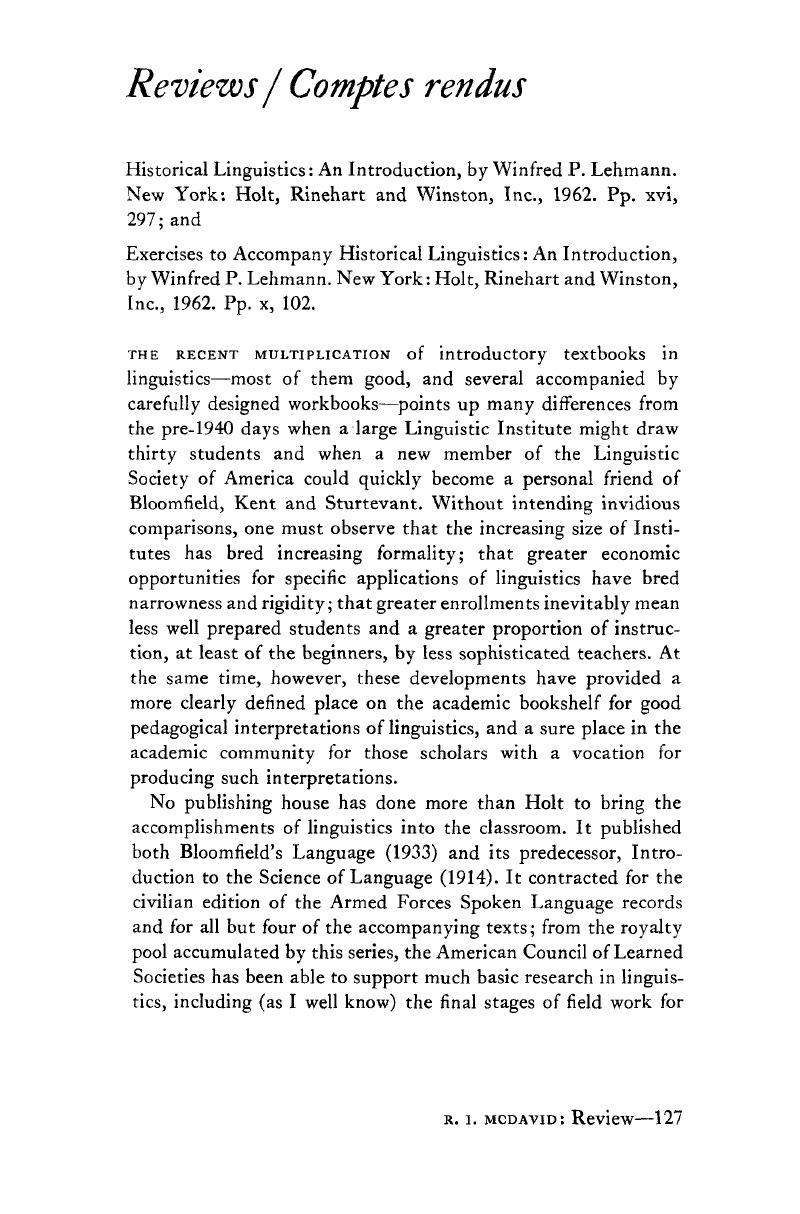No CrossRef data available.
Published online by Cambridge University Press: 27 June 2016

1 At the Darwin Centennial celebration (Chicago, 1959) Alfred Kroeber reminded the preparatory seminar that The Origin of Species did linguistics, and other anthropological disciplines, a disservice by confirming an existing historical and evolutionary bias, and diverting attention from the need for the serious descriptive work which botanical and zoological taxonomists had undertaken in the eighteenth century but which linguistics was not to undertake till nearly 1900.
2 See Joos, Martin, The Five Clocks, Bloomington, Ind., 1962, and “Homeostasis in English Usage,” College Composition and Communication 13 (Oct. 1962), pp. 18–22 CrossRefGoogle Scholar. Harold B. Allen has often lectured on the complicated interrelationships of dimensions of usage, but his presentation still remains unpublished.
3 Lehmann properly avoids the petty attacks on linguistics launched by denigrators of the Merriam Webster’s Third New International Dictionary (1961). A recent effusion, The Treasure of Our Tongue, by one Lincoln Barnett (1964), has a concluding chapter purporting to discuss the “current assault on [the English language] by the advocates of modern teaching methods, the editors of Webster’s Third New International Dictionary, and the structural linguists.” Many a linguist, wondering why his painful labors of discovery and analysis could be considered an attack on anything and why his opinions could presumably affect the speech and writing of millions, may recall wryly the occasion when Nicholas Murray Butler reprimanded a distinguished member of the Columbia University faculty for excessive drinking: when informed that if he drank less he would have more influence on the students, the scholar replied, “Do you think you pay me enough for me to have any influence?”
4 4”Is Armenian an Anatolian Language?” Language 18 (1942), pp. 22-26; “Criteria for Phonetic Similarity,” Language 23 (1957), pp. 538-44; “Phonotactics and the Identity Theorem,” Studies in Linguistics 15 (1960), pp. 14-18; “The Scientific Method and Historical Linguistics,” Journal of the American Oriental Society 65 (1945), pp. 63-64.
5 Wenker sought to elicit evidence on the phonetics of German dialects—the domain where correspondents are least likely to be adequately or consistently trained. In vocabulary, however, the situation is quite different. Acting on a suggestion from A. H. Marckwardt, A. L. Davis showed the usefulness of the correspondence method for determining lexical isoglosses, in A Word Atlas of the Great Lakes Region, diss, (microfilm), U. of Michigan, 1949. Since 1949, correspondence questionnaires have been effectively used to elicit vocabulary evidence in most of the American regional surveys; in Scotland (in a different dialect situation) they have been also used for grammatical and phonemic (but not phonetic) data.
6 E.g., High-Church structuralists and their transformationalist progeny often complain that the American Atlas project pays too much attention to the old-fashioned rural folk vocabulary; conversely, students of vocabulary survival, and other folklorists, complain that it pays too little.